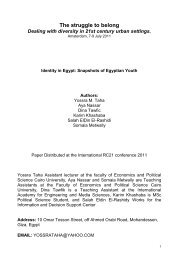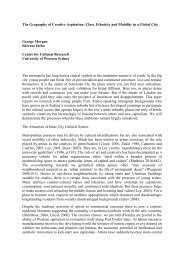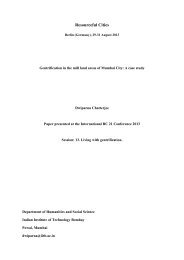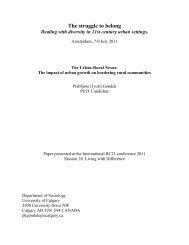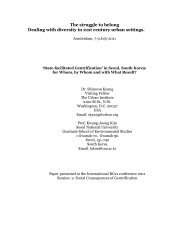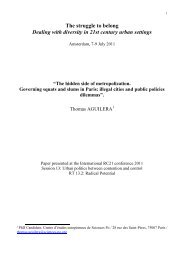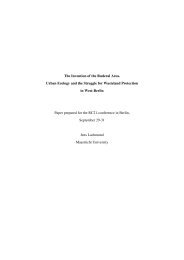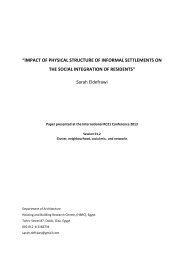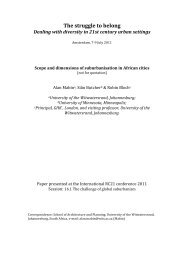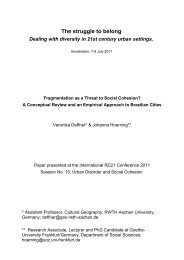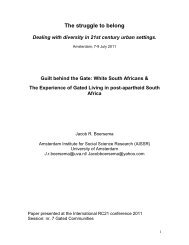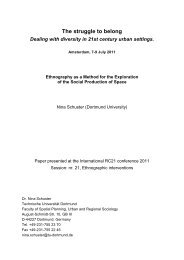Gentrification as a broad process of reurbanization - RC21 ORG ...
Gentrification as a broad process of reurbanization - RC21 ORG ...
Gentrification as a broad process of reurbanization - RC21 ORG ...
Create successful ePaper yourself
Turn your PDF publications into a flip-book with our unique Google optimized e-Paper software.
Judit Veres CEU Budapest<br />
it can be <strong>of</strong> public relevance, that it can have wider implications beyond these walls.<br />
This h<strong>as</strong> happened in a wider context where arts and literature in general have lost<br />
their former anti-establishment edge, the political dimension, the authority attached to<br />
them during socialism. With the democratizing <strong>process</strong> artistic freedom and choice<br />
h<strong>as</strong> incre<strong>as</strong>ed, culture h<strong>as</strong> become more and more commodified, packaged for<br />
individual consumption with the concomitant fragmentation and dissolution <strong>of</strong> a more<br />
unified public into lifestyle groups and niche markets.<br />
The diminished importance <strong>of</strong> Trafó in the city‘s cultural life is also due to the fact<br />
there are incre<strong>as</strong>ingly more places all over the city, which <strong>of</strong>fer culture in the form <strong>of</strong><br />
cultural entertainment for the young generation too, for people in their teens and<br />
twenties. Many <strong>of</strong> these places are more inclusive and accessible in the sense <strong>of</strong>, for<br />
example, making entry free <strong>of</strong> charge, and secondly by housing performances that can<br />
be more quickly consumed and which are thought <strong>of</strong> <strong>as</strong> more cool. While talking to<br />
the Trafó people, I w<strong>as</strong> told that many <strong>of</strong> the ruin pubs pose a serious challenge in so<br />
far <strong>as</strong> cultural entertainment there comes for free, something that Trafó cannot afford.<br />
The place‘s credentials <strong>as</strong> a cosmopolitan urban space no doubt had to do with the<br />
influence <strong>of</strong> foreign state foundations which appeared all over the former socialistblock<br />
upon these states‘ embrace <strong>of</strong> the market economy. For example the role that<br />
the Dutch Matra Fund had on kick starting Trafó (a programme <strong>of</strong> the Dutch Ministry<br />
<strong>of</strong> Foreign Relations), Pro Helvetia the Swiss arts council, and the British Council<br />
whose stated mission besides promoting artistic creation, and fostering cultural<br />
exchange, h<strong>as</strong> been to open up important regions <strong>as</strong> markets for Dutch, Swiss and<br />
respectively British cultural practitioners but obviously not only for them. The Soros<br />
Foundation had played a similar role, funding all sorts <strong>of</strong> projects, events, running<br />
programmes that were supposed to build up an open society. If one visits these<br />
organizations‘ websites it becomes apparent that the attention and financial support <strong>of</strong><br />
the respective states h<strong>as</strong> moved further, prioritizing other emerging markets in North<br />
Africa, the Cauc<strong>as</strong>us for example, with China receiving incre<strong>as</strong>ed attention. This shift<br />
in focus can be observed in the orientation <strong>of</strong> EU-funded projects <strong>as</strong> well, where<br />
western arts organizations are incre<strong>as</strong>ingly looking for partnerships beyond Central-<br />
E<strong>as</strong>tern Europe, to regions and their markets that are <strong>of</strong> more interest now for the old<br />
EU, like China, the Middle E<strong>as</strong>t, North Africa etc.<br />
18




